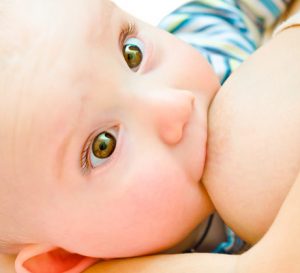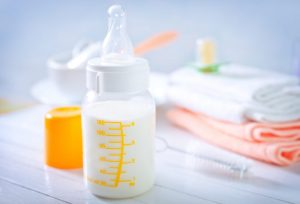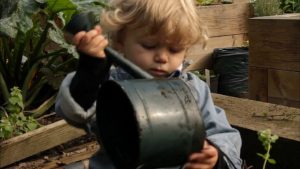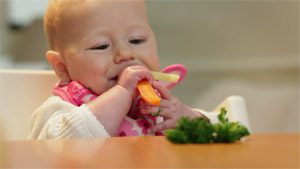There are many things you can do after the birth of your baby as well to help build their immune systems. For example:
Breastfeed your baby as breastmilk contains a wide range of antibodies to enhance your baby’s immune systemThere is increasing evidence that gut bacteria and skin flora has an impact on health. A vaginal birth (or a vaginal swab following a C-section) followed by skin to skin contact with your baby helps to colonise your baby with optimal friendly gut and skin bacteria or flora.
Breastfeeding is good for your baby’s immune system

Guidelines suggest that 6 months exclusive breastfeeding is the best thing for a baby followed by continued breastfeeding alongside the introduction of solid food. Breastmilk contains antibodies from the mum that protect your baby and build her immune system.
One of the main ways that your child’s immunity develops is being challenged by a range of normal microbes and germs in the environment. Our immune system has evolved over millions of years to protect the body from bacteria, viruses and other parasites.
In recent decades, we have overused anti-bacterial products in our environment, killing many of the friendly microbes in our houses with cleaning products etc.
Many doctors today are now warning that it might not be good to be ‘too clean.’ The “Hygiene Hypothesis” suggests that one of the reasons that recent generations of children are suffering from increased rates of eczema, asthma, hay fever and auto-immune diseases is that our highly developed immune system attacks itself (or safe things like pollen) when there are not enough natural microbes and parasites around for our immune system to deal with.

That said bacteria that can cause bad tummy bugs can grow quickly in a bottle so bottles should be sterilised for your baby’s first year. However, you can encourage your baby to drink out of a beaker when you introduce solids. After 6 months, beakers, bowls, and cutlery can simply be washed in hot soapy water with no need to sterilise them as they are easy to clean and do not breed germs in the same way that a warmed bottle of formula milk does.

Babies, once they start crawling, want to explore what’s going on around them. They want to go out in the garden and get their hands dirty. They want to pick grass and find interesting things and you should be allowing them to do that. That’s important and a normal part of their development and the development of their immune system.
Antibiotics are not good for your baby unless there is a real need owing to a bacterial infection. Most illnesses for babies and children are caused by viruses, and antibiotics treat only illnesses caused by bacteria. Bacteria will grow bigger and stronger if they are consistently exposed to antibiotics, so it becomes harder and harder to clear, say, a bacterial ear infection. Antibiotics can also wipe out the friendly bacteria in your baby’s gut, which can really harm their digestion. As much as you can, let you baby go through the occasional mild cold or a sore throat – and they’ll build up their natural immunity by doing so.
However, follow your instincts if you think your baby is very ill (and e.g., has a non-blanching rash) as antibiotics are vital in the case of blood sepsis.
Make sure your child is up to date with the recommended immunisations that are available to her on the NHS or from your child’s doctor.
Getting outside a lot – even before babies can walk – is great for them. Once they can move around, plenty of outside exercises is good too. Fresh air and exercise help babies sleep better, eat better, keeps them fit and therefore stronger to fight off bugs when they catch them.
Sunlight stimulates the production of Vitamin D which is a vital vitamin for immune systems. In northern countries like the UK, it is not possible to manufacture enough Vitamin D from sunlight and diet alone so a Vitamin D supplement is recommended.
Fruit and Veggies

When you start introducing your baby to solids, make sure to include plenty of fresh fruit and veggies – full of immune-boosting vitamins and minerals.
Babies and small children need to drink a lot of water. We need liquid to keep our bodies hydrated and energised, and water is the key way for delivering nutrients to all our body cells. This will keep them in a better state to fight off viruses and bugs.
Amino acids in proteins from the building blocks of the cells that form the immune system (and all cells!). The way the immune system fights germs is by increasing its own number and to do this, it needs protein. So to do this, your baby needs things like chicken, fish, eggs, lamb, lentils and other beans from six months of age.
Many studies have shown that sugar – particularly processed sugar – suppresses the immune system and may promote the growth of ‘bad’ bacteria in the gut. So keep kids’ sugar to a minimum to make sure they’re in a good state to fight off germs.
Keep things smoke free
Keep your baby away from cigarettes – no one should be smoking near them, but also avoid smoking outside and then coming back in. Being exposed to smoke increases the risk of SIDS, bronchitis, asthma and ear infections – all of which can run down a growing immune system. If you or your partner really can’t stop smoking, then at least smoke outside the house and wash face and hands, and ideally change clothes when coming back in.